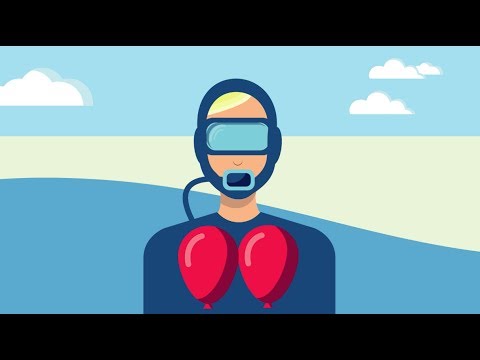Scuba Diving for Beginners – Understanding Atmospheres Underwater is Easy
Learning about atmospheres underwater is easy! This short motion graphic explains the basics of pressure, density and volume underwater while diving.
Learn more about diving at: chrisbrockscuba.com
Audio Script:
Think about it. Your lungs are balloons.
When you breathe in, your lungs inflate, and when you breath out, your lungs deflate.
So what would happen if you held your breath while scuba diving?
If you held your breath while descending, your lungs will become smaller – creating dense pressure inside your full lungs. If you held your breath as you ascended, the air in your lungs would increase in size under pressure. In either scenario, eventually your lungs would fail. This is why the number 1 rule of scuba diving is NEVER HOLD YOUR BREATH!
So, you might be thinking – why does pressure change underwater? It’s simple. The deeper you dive, the higher atmosphere you’re in. When diving into a higher atmosphere, the volume of air spaces will get smaller, and the molecules in those spaces will become more compact.
The term atmosphere is simply a unit to measure ambient pressure. Since water is denser than air, greater changes in ambient pressure occur underwater. Every 33 feet of depth adds another atmosphere to the ambient pressure. Once you understand atmospheres you can calculate your own air consumption at a given pressure, helping you plan your dives efficiently and accurately.
As a recreational scuba diver, you are trained to dive safely between 1 and 5 atmospheres. At sea level you start your dive at 1 and as you descend deeper underwater, the pressure and density increases – and the volume decreases.
This relationship between pressure, density and volume stays consistent as you dive. At 33 feet deep you’re at 2 atmospheres. At this depth, volume is 1/2 of what it was on the surface and the density is 2 times denser.
This relationship continues as you dive deeper – all the way down to 132 feet where at 5 atmospheres the volume is 1/5 of what it was on the surface and the density is 5 times denser.
Make sense? Think about it this way. If you had a balloon at the surface with a volume of 10 units, taking it down to 5 atmospheres, would reduce the balloon’s volume to 2 units – because at 132 feet, the volume of an object is 1/5 of what it was on the surface.
source

But why? I have a question if anybody could answer it would be nice. When you take the balloon down the water the high pressure forces the surface of the balloon to shrink when sinking and expand on the way up because its pushing literally on the surface of the balloon, but aren't our lungs in our chest? like surrounded with bones, why does it change volume when going up or down? Do the actual ribs contract that much so they push on lungs? What if I put a balloon in a sealed glass bottle and did this experiment, would the same thing happen?
If you ascend with full lungs surely the expansion makes it escape out your face holes? It must actually take quite a conscious effort to hold your oesophagus closed against the pressure I would have thought. When I freedive exhaling on the way up is a really nice part of the dive( warmest too) that has always been instinctual with me.
Volume argument is crap because your body does not change volume so drastically when you descend. Your lungs are not 1/5th of their size at 132ft – they're 20% as efficient as at sea level because of increased pressure. That is all assuming your muscles are able to get the ribcage open to the same level.
I interesting scuba diving course but I don't have money…
Thank you
First thing is crap. Holding breath is safe when descending…. If it was true.. non freediver would live
I've always loved the balloon example! 🙂 Useful video about the basics to help beginners understand why you never hold your breath when breathing compressed air under water. Thanks for this video Chris!
U scared me … had such a negative impact on scuba after watching this video
What if you only go like 5 ft
Be pleased and talk in The fucking global metric systen
Atmospheres also increase by 1 per ~10 meters
There is no one in these ocean depths so don't hold your breath